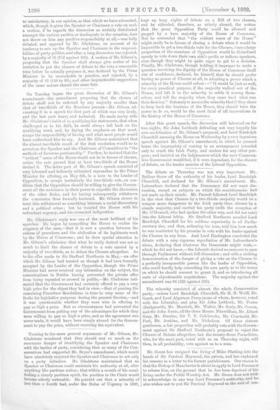On Tuesday began the great discussion of Mr. Gibson's amendment—the
amendment proposing that the closure of debate shall not be enforced by any majority smaller than that of two-thirds of the Members present—Mr. Gibson ad- vocating it in a speech the first part of which was very lively, and the last part heavy and technical. He made merry with Mr. Gladstone's habit of so qualifying his statements, that when challenged as to his drift, he could always fall back on the qualifying word, and, by laying the emphasis on that word, escape the responsibility of having said what most people would have understood him to say. And Mr. Gibson maintained that the almost inevitable result of the first resolution would be to accustom the Speaker and the Chairman of Committees to "the methods of decorous partisanship." Further, he insisted that the " evident " sense of the House would not be in favour of closure, unless the vote proved that at least two-thirds of the House desired it. The latter part of Mr. Gibson's speech consisted of very laboured and tediously reiterated reproaches to the Prime Minister for offering, on May 6th, in a note to the Leader of Opposition, to accept tentatively the two-thirds rule, on con- dition that the Opposition should be willing to give the Govern- ment all the assistance in their power to expedite the discussion of the other Rules, and for having subsequently withdrawn the concession thus formally tendered. Mr. Gibson strove to treat this withdrawal as something between a social discourtesy and a political crime ; but he wearied the House with his redundant urgency, and his overacted indignation.


































 Previous page
Previous page